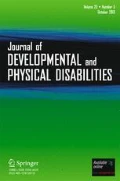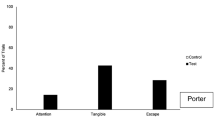Abstract
Functional communication training (FCT) was conducted by parents of 17 young children with autism spectrum disorders who displayed problem behavior. All procedures were conducted at regional clinics located an average of 15 miles from the families’ homes. Parents received coaching via telehealth from behavior consultants who were located an average of 222 miles from the regional clinics. Parents first conducted functional analyses with telehealth consultation (Wacker, Lee et al. Journal of Applied Behavior Analysis, in press) and then conducted FCT that was matched to the identified function of problem behavior. Parent assistants located at the regional clinics received brief training in the procedures and supported the families during the clinic visits. FCT, conducted within a nonconcurrent multiple baseline design, reduced problem behavior by an average of 93.5 %. Results suggested that FCT can be conducted by parents via telehealth when experienced applied behavior analysts provide consultation.

Similar content being viewed by others
References
Asmus, J. M., Ringdahl, J. E., Sellers, J. A., Call, N. A., Andelman, M. S., & Wacker, D. P. (2004). Use of a short-term inpatient model to evaluate aberrant behavior: outcome data summaries from 1996 to 2001. Journal of Applied Behavior Analysis, 37, 283–304.
Barretto, J., Wacker, D. P., Harding, J., Lee, J., & Berg, W. K. (2006). The use of telemedicine to conduct brief functional analysis and behavioral consultation. Journal of Applied Behavior Analysis, 39, 333–340.
Behavior Analyst Certification Board (2012). Certificant registry. Retrieved October 1, 2012, from http://www.bacb.com/index.php?page=100155&by=state.
Berg, W. K., Wacker, D. P., Harding, J. W., Ganzer, J., & Barretto, A. (2007). An evaluation of multiple dependent variables across distinct classes of antecedent stimuli pre and post functional communication training. Journal of Early and Intensive Behavioral Intervention, 3(4)-4(1), 305–333.
Bloom, S. E., Iwata, B. A., Fritz, J. N., Roscoe, E. M., & Carreau, A. B. (2011). Classroom application of a trial-based functional analysis. Journal of Applied Behavior Analysis, 44, 19–31.
Call, N. A., Pabico, R. S., & Lomas, J. E. (2009). Use of latency to problem behavior to evaluate demands for inclusion in functional analyses. Journal of Applied Behavior Analysis, 42, 723–728.
Carr, E. G., & Durand, V. M. (1985). Reducing behavior problems through functional communication training. Journal of Applied Behavior Analysis, 18, 111–126.
Derby, K. M., Wacker, D. P., Berg, W., DeRaad, A., Ulrich, S., & Asmus, J. (1997). The long-term effects of functional communication training in home settings. Journal of Applied Behavior Analysis, 30, 507–531.
Durand, V. M., & Carr, E. G. (1985). Self-injurious behavior: motivating conditions and guidelines for treatment. School Psychology Review, 14, 171–176.
Harding, J. W., Wacker, D. P., Berg, W. K., Lee, J. F., & Dolezal, D. (2009). Conducting functional communication training in home settings: a case study and recommendations for practitioners. Behavior Analysis in Practice, 2(1), 21–33.
Kurtz, P. F., Chin, M. D., Huete, J. M., Tarbox, R. S. F., O’Connor, J. T., Paclawskyj, T. R., et al. (2003). Functional analysis and treatment of self-injurious behavior in young children: a summary of 30 cases. Journal of Applied Behavior Analysis, 36, 205–219.
Lalli, J. S., Casey, S. D., & Kates, K. K. (1995). Reducing escape behavior and increasing task completion with functional communication training, extinction, and response chaining. Journal of Applied Behavior Analysis, 28, 261–268.
Pelios, L., Morren, J., Tesch, D., & Axelrod, S. (1999). The impact of functional analysis methodology on treatment choice for self-injurious and aggressive behavior. Journal of Applied Behavior Analysis, 32, 185–195.
Reimers, T., & Wacker, D. (1988). Parents’ ratings of the acceptability of behavioral treatment recommendations made in an outpatient clinic: a preliminary analysis of the influence of treatment effectiveness. Behavioral Disorders, 14, 7–15.
Rogers, S., & Wallace, K. (2011). Intervention for infants and toddlers with autism spectrum disorders. In D. Amaral, G. Dawson, & D. Geschwind (Eds.), Autism spectrum disorders (pp. 1081–1094). Oxford: Oxford University Press.
Tiger, J. H., Hanley, G. P., & Bruzek, J. (2008). Functional communication training: a review and practical guide. Behavior Analysis in Practice, 1, 16–23.
Volkert, V. M., Lerman, D. C., Call, N. A., & Trosclair-Lasserre, N. (2009). An evaluation of resurgence during treatment with functional communication training. Journal of Applied Behavior Analysis, 42, 145–160.
Wacker, D. P., Berg, W. K., Harding, J. W., Derby, K. M., Asmus, J. M., & Healy, A. (1998). Evaluation and long-term treatment of aberrant behavior displayed by young children with disabilities. Journal of Developmental and Behavioral Pediatrics, 19, 260–266.
Wacker, D. P., Berg, W. K., & Harding, J. W. (2004). Maintenance effects of functional communication training. Washington: Department of Health and Human Services, National Institute of Child Health and Human Development.
Wacker, D. P., Berg, W. K., Harding, J. W., Barretto, A., Rankin, B., & Ganzer, J. (2005). Treatment effectiveness, stimulus generalization, and acceptability to parents of functional communication training. Educational Psychology, 25(2–3), 233–256.
Wacker, D. P., Harding, J. W., Berg, W. K., Lee, J. F., Schieltz, K. M., Padilla, Y. C., et al. (2011). An evaluation of persistence of treatment effects during long-term treatment of destructive behavior. Journal of the Experimental Analysis of Behavior, 96, 261–282.
Wacker, D. P., Harding, J. W., Morgan, T. A., Berg, W. K., Schieltz, K. M., Lee, J. F., et al. (in press). An evaluation of resurgence during functional communication training. The Psychological Record.
Wacker, D. P., Lee, J. F., Padilla Dalmau, Y. C., Kopelman, T. G., Lindgren, S. D., Kuhle, J., et al. (in press). Conducting functional analyses of problem behavior via telehealth. Journal of Applied Behavior Analysis.
Author information
Authors and Affiliations
Corresponding author
Additional information
This investigation was supported by Grant R01-MH089607-01 from the National Institute of Mental Health of the National Institutes of Health. The content is solely the responsibility of the authors and does not necessarily represent the official views of the National Institute of Mental Health or the National Institutes of Health. The authors express their appreciation to the families who participated in this investigation, to the nurses and family support staff at the Child Health Specialty Clinics, and to Agnes DeRaad for her assistance with manuscript preparation.
Rights and permissions
About this article
Cite this article
Wacker, D.P., Lee, J.F., Padilla Dalmau, Y.C. et al. Conducting Functional Communication Training via Telehealth to Reduce the Problem Behavior of Young Children with Autism. J Dev Phys Disabil 25, 35–48 (2013). https://doi.org/10.1007/s10882-012-9314-0
Published:
Issue Date:
DOI: https://doi.org/10.1007/s10882-012-9314-0




